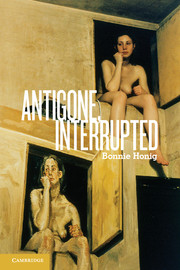Book contents
- Frontmatter
- Contents
- Preface
- Acknowledgments
- Introduction
- Part I Interruption
- Part II Conspiracy
- 4 Mourning, membership, and the politics of exception: plotting Creon's conspiracy with democracy
- 5 From lamentation to logos: Antigone’s conspiracy with language
- 6 Sacrifice, sorority, integrity: Antigone's conspiracy with Ismene
- Conclusion
- About the Cover Image
- Notes
- Bibliography
- Index
Conclusion
Published online by Cambridge University Press: 05 May 2013
- Frontmatter
- Contents
- Preface
- Acknowledgments
- Introduction
- Part I Interruption
- Part II Conspiracy
- 4 Mourning, membership, and the politics of exception: plotting Creon's conspiracy with democracy
- 5 From lamentation to logos: Antigone’s conspiracy with language
- 6 Sacrifice, sorority, integrity: Antigone's conspiracy with Ismene
- Conclusion
- About the Cover Image
- Notes
- Bibliography
- Index
Summary
Every reading of a classic is in fact a rereading.
Italo CalvinoDoes my reading of Sophocles’ Antigone alter our understanding of the canonical source in order to make it user-friendly to late-modern readers and spectators, as Slavoj Žižek might worry? Žižek articulates this concern in discussing law rather than canonical texts, but the point can be extended: “[W]hen we change legal norms [or canonical texts] to accommodate them to the new demands of reality . . . we a priori deprive the law [or canonicity] of its dignity because we treat legal norms [canonical texts] in a utilitarian way” (2000: 673). That may be. But sometimes, rather than instrumentalize the law or the text, we may find alternatives or nuances that testify not to our contemporary partialities and insistences but to those of prior receptions. From what perspective could we know that our newest readings are mere easy-going accommodations and earlier ones more rigorous and authentic? The received Antigone, in which sisters are split and the paternal law may stumble but carries on, may itself be an example of an earlier, reassuring reading in need of a certain less reassuring overcoming. Our new readings may not be “self-confirmation[s]” (Goldhill 2012: 247) but rather the hard-earned products of new perspectives, alien genres, and innovative interpretative resources. We may even think of Sophocles’ text as poised for self-overcoming. Why should we assume that the strict paternal reading (of the law, or the text) is the one with fidelity to the original text or the Real, while the seemingly more capacious one, the conspiratorial or the sororal one, say, is the product of “retroactive rewriting”? As I have tried to suggest throughout, the reverse might just as well be true. Or, better, new readings may seem to exemplify new demands of reality but need not be left there; they may just as well expose old demands of reality, as exemplified by prior readings.
- Type
- Chapter
- Information
- Antigone, Interrupted , pp. 190 - 197Publisher: Cambridge University PressPrint publication year: 2013



